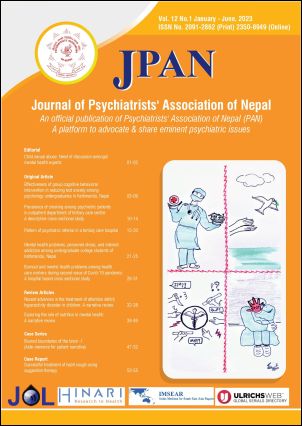Effectiveness of group cognitive behavioral intervention in reducing test anxiety among psychology undergraduates in Kathmandu, Nepal
DOI:
https://doi.org/10.3126/jpan.v12i1.59418Keywords:
Test Anxiety, Undergraduate, Group Cognitive Behavioral TherapyAbstract
Background: High test anxiety negatively impacts students, affecting academic performance, well-being, focus, and retention rates. Cognitive Behavioral Therapy (CBT) is a promising approach to reducing test anxiety, and we aimed to assess the effectiveness of group-based CBT in reducing test anxiety among undergraduate students.
Material and Method: This experimental, independent two-group design enrolled 80 test-anxious participants, randomly assigning them to a control or intervention group (40 participants each). Westside Test Anxiety Scale was the primary outcome measure, and participant's feedback was collected. The intervention group received ten sessions of group-based CBT. Baseline and endline data were analyzed, and effect size was reported.
Results: Participant feedback was analyzed qualitatively. The intervention group demonstrated 16% reduction in test anxiety score from their baseline, while the control group showed only 5.54% reduction from their baseline. In contrast, the control group showed a 2-point reduction, representing a 5.54% decrease. This difference was statistically significant (effect size= -0.53), supporting moderate effectiveness. Further, scores in specific test anxiety areas, such as worry about forgetting during the study and performance after exams, showed notable improvement. Participant feedback highlighted improved stress management, self-awareness, and understanding of emotions. Suggestions incorporating visual aids and increasing interactivity for the future.
Conclusion: This study demonstrates utility of group-based CBT in reducing test anxiety among undergraduate students. A larger scale randomized controlled trial is needed to evaluate the effectiveness of group CBT in a larger population, and future studies can focus on examining the effect of group CBT delivered by non-specialists in a broader population.
Downloads
Downloads
Published
How to Cite
Issue
Section
License

This work is licensed under a Creative Commons Attribution 4.0 International License.
This license enables reusers to distribute, remix, adapt, and build upon the material in any medium or format, so long as attribution is given to the creator. The license allows for commercial use.




